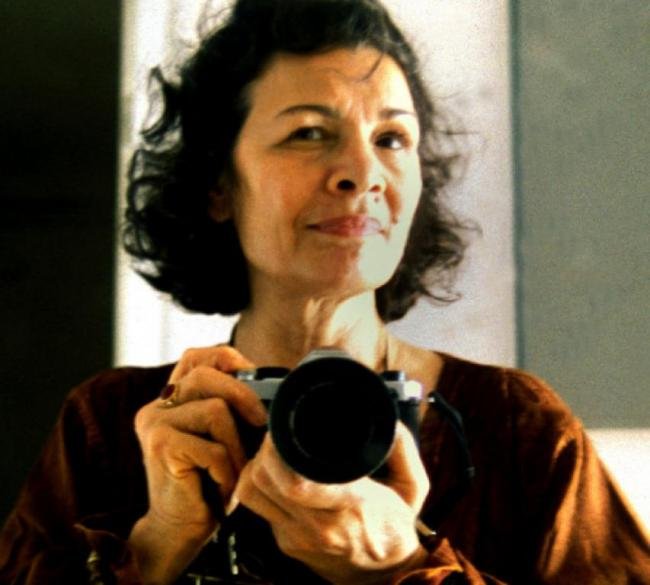Four Canadian journalists who were killed for doing their jobs
Ziba Kazemi was a Canadian photojournalist murdered in Iran. Photo courtesy zibakazemi.org
By Emina Gamulin
Every year journalists around the world die on the job, either as a result of working under dangerous conditions or as a direct result of being targeted for the work they do.
Friday April 28 is the National Day of Mourning, a day for Canadians to remember workers killed or injured on the job and pay respects to the families and friends that they leave behind, and Unifor 87-M would like to pay tribute to these four incredible journalists who lost their lives doing the work they loved.
Ali Mustafa 1984-2014
Ali Mustafa was a Toronto-based journalist, activist and photographer who covered social justice issues in Canada and around the world. He had a reputation for being a “people’s journalist” — someone who was there to help in times of crisis, a reputation that helped him develop deep relationships with the communities he covered.
He was killed in Aleppo, Syria in 2014 while investigating a bomb strike by the Assad government. True to form, Mustafa had put down his camera and was helping pull out injured and killed Syrians when a second bomb hit, proving fatal for Mustafa and his group.
His friend and fellow journalist, Jihan Hafiz, wrote in her story Alone on the Front Line on how Mustafa, as a freelancer, was short on cash at the time of his death as the news outlets he was reporting for were slow to pay him.
“He was under constant bombing and shelling from Assad’s military. Writing me from the heart of Aleppo, Ali had no insurance, no safety net, nothing,” she wrote. “I begged him to leave. Before we were abruptly cut off, he said, ‘I’ve got to make money first. I don’t even have enough for my plane ticket home yet.’”
Out of this tragedy the Ali Mustafa Memorial Collective was born, with one of the group’s main goals being to highlight the extra dangers freelancers working in warzones face.
Every year, The Ali Mustafa Memorial Award for People’s Journalism gives $3,000 to a freelance journalist doing precarious work, with the intention of making their working conditions better.
Michelle Lang 1975 - 2009
The news of Michelle Lang’s death in Afghanistan was met with shock and immense sadness at the Calgary Herald where she worked as a reporter.
“There was no one in that newsroom who was not completely affected by the loss of Michelle,” recalled her friend and Herald colleague Gwendolyn Richards. “It was like the air had been sucked out of the room.”
Lang, 34 at the time of her death, had no formal journalism training, but nonetheless managed to work her way up from a small community paper to a big city daily. She had a reputation as talented and diligent journalist and was recognized for her work on covering the Alberta health-care system with a National Newspaper Award.
“She was an incredibly tenacious reporter who took very seriously her responsibility to cover news and hold organizations like the government accountable and tell stories that need to be told,” said Richards.
Richards also remembers Lang as warm and generous friend, who let Richards crash at her place for days when Richards first moved to Calgary and was at the time a near-stranger to Lang.
Lang died when the military vehicle she was in hit a roadside bomb, killing four Canadian soldiers, with Lang later dying from her injuries.
In the wake of her death, Postmedia set up the Michelle Lang Fellowship, which offers a young journalist the opportunity to spend six months at their Parliamentary hub and six months reporting for the Herald, working on stories that are local, national and international in scope and the opportunity to do investigative work, which Richards said Lang excelled at.
“Even though this many years have passed, she still holds a place in our heart and is deeply missed.”
Ziba Kazemi, 1948 – 2003
Ziba Kazemi, better known to some as Zahra Kazemi, was a Canadian freelance photojournalist of Iranian background, whose work had taken her to 25 countries in a decade, before she was murdered in Iran.
Her son Stephan Kazemi describes her as an intellectual who was full of integrity.
“When she left Iran it was before the revolution in the 70s to go to France,” he said over the phone. “The reason she never went to Iran was because she never recognized the legitimacy of the government.”
In 2003 she had just finished covering the American occupation of Iraq when she found herself in her homeland, after a quarter century of absence, waiting for work visas. There were delays, so when she learned of the mass demonstrations going on in Iran, she decided to cover them.
An estimated 4,000 students went missing after the protests were squashed by the government, and Kazemi went to take photos of the family members gathered outside the prison where the students were thought to be. It was there that she was kidnapped by officials and held for interrogation.
Her medical examiner at the hospital where she later died said her body showed signs of torture including a skull fracture, broken nose, severe abdominal bruising and signs of rape, but Iranian officials at the time claimed she suffered a stroke.
The story blew up when Stephan brought the doctor to Canada for a press conference and her story made headlines around the world.
A Canadian judge originally ruled that Stephan could try to sue Iran in civil court, but this was blocked at the Supreme Court. He is working on a documentary on his mother’s life and death and runs a website documenting her work and his struggles with both the Iranian and Canadian governments.
While Stephan says the horrific crime and subsequent battles have left him “drained,” his fight continues. “For me, I’m not going to let go and I’m going to go to the end of this, no matter what.”
Tara Singh Hayer, 1936 - 1998
Tara Singh Hayer became entangled in the Air India bombing case after overhearing a man speak about the terrorist act while visiting the offices of a Punjabi newspaper in London, England.
He did not give an affidavit to police until 1995 after the publisher of the British paper was murdered. Three years later, before police made arrests in the Air India bombings, Hayer was shot in his garage, execution style, while exiting his car.
To date, the murder remains unsolved and his statements to police about the Air India bombing were not allowed into evidence at the trial of two men who were later acquitted.
Hayer came to Canada in the 1970s and worked as miner, teacher and truck driver before starting his journalism career and becoming the publisher of the Indo-Canadian Times, a Punjabi language newspaper based in Surrey, B.C.
A fierce critic of both the ruling government in India and Sikh militant groups, he survived two previous attempts on his life: a bomb left outside his office that police detonated and an earlier shooting that had left him paralyzed from the waist down.
His son, former British Columbia MLA Dave Hayer, has publically spoken of his father’s bravery many times.
“My father’s life was devoted to democracy, freedom of speech, and freedom of the press to speak out against those who try to prevent those freedoms, the right that we in Canadian society hold so precious, to live and speak without fear,” he said at a memorial for his father.
The elder Hayer is to date believed to be the only journalist to be assassinated in Canada for the work he did.
In his memory, The Canadian Journalists for Free Expression renamed its Press Freedom Award the Tara Singh Hayer Press Freedom Award. It is given out annually to a Canadian journalist who upholds the principle of freedom of the press in Canada or abroad.

